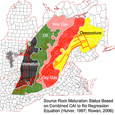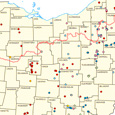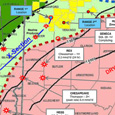Ohio lawmakers seek a timeline for pooled oil and gas leasing
Wednesday, March 11, 2015

SALEM, Ohio —A Harrison County landowner and farmer would like to have his land developed for oil and shale gas, and so would his neighbors, who have all agreed to leasing terms for more than 600 combined acres.
There’s just one problem, though, according to David Schaffner, who owns 158 of the acres. The landowners and the drillers haven’t been able to convince the state, which owns a narrow strip of land that runs parallel to state Route 151 and accounts for about 3.5 percent of the land unit neighbors are trying to lease, to sign.
The property in question is owned by the Ohio Department of Transportation, according to Schaffner, who has been petitioning state agencies to allow the property to be leased.
“This is virtually abandoned land,” he said. “They’re not doing anything with it except let it get overgrown with weeds and brush.”
Delaying the lease
Schaffner said the only response he’s received from ODOT, twice, is that the state agency is “not in a position to make a decision” on whether to lease its mineral interests. Schaffner said Chesapeake filed an application in April of 2014 to “force unitization,” which would force ODOT to join the lease, if certain requirements are met.
ODOT did not file any opposition, according to Schaffner, but so far nothing has been approved, and there’s no timeline for when an approval might come. That could all change, though, if a bill being considered by the Ohio House Energy and Natural Resources Committee is successful.
The bill, known as H.B. 8, would set a 45-day time limit for the state’s chief of the Division of Oil and Gas to hold the required hearing on unitization. The bill also specifies the chief’s order must come no later than 30 days after the hearing. Such a timeline would bring relief to landowners like Schaffner, who say they’re losing money by not being able to lease their own land for production.
“They’ve already put the people in my unit in jeopardy,” he said.
Making a decision
Eric Heis, public information officer for the Ohio Department of Natural Resources, said the department must consider not only the parties who want to join a particular pool, but also those who oppose.
He said the department is “doing our due dilligance and taking our time” before issuing a decision.
Excludes nature preserves
The bill is sponsored by Representatives Christina Hagan, R-Alliance, and Rep. Tim Ginter, R-Salem. Alex Thomas, legislative aide to Ginter, said the bill excludes nature preserves and that surface drilling would not be taking place on state land.
“We’re not trying to go after state nature preserves,” Thomas said, adding that most of the land in question is owned by ODOT.
Still, even the mention of “state land” is a “hot botton,” said Heis, who added that ODNR is trying to be cafeful of what kind of precedent it sets. He said there are about five pooling cases that are still pending with ODNR. Thomas said the cost to apply for a land unit is $10,000 and that landowners and developers deserve answers.
“A little (piece) of state-owned land shouldn’t tie up a whole unit,” he said.
Thomas said he was equally concerned that delaying the decision for too long will cause energy companies to move to other locations.
“It’s costing landowners money (and) the state is losing money,” he said.
Other wells
Schaffner testified before the House committee March 3. He said there are other wells affected by the same issue, as many as 30 from his calculations. He told the committee he’s “at a complete loss” to understand why ODOT won’t lease the minerals.
According to the bill being considered, the chief would be required to issue an order for unit operation of a pool or part of a pool on the land units “owned or controlled by the state or a political subdivision, except nature preserves.”
The land unit would still have to meet certain requirements and would need to be requested by the owners of at least 65 percent of the land above the pool. The bill also codified various parts of the process, and states that “the only method” for valuing oil and gas reserves is to employ an existing discounted cash flow formula.




